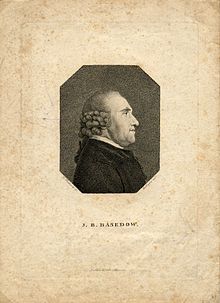Johann Bernhard Basedow
Johann Bernhard Basedow | |
|---|---|
 Johann Bernhard Basedow | |
| Born | September 11, 1724 Hamburg |
| Died | July 25, 1790 (aged 65) Magdeburg |
| Occupations |
|
| Signature | |
Johann Bernhard Basedow (German pronunciation:
Early life
Basedow was born in
In 1744, Basedow went to the
Teacher and academic
Between 1749 and 1753, Basedow was a private tutor to the son of Herr von Quaalen, a nobleman living in
In 1753, he was appointed professor of moral philosophy and belles-lettres at Sorø Academy in Denmark. He proved to be a very popular teacher and was also called on to lecture on Theology. However, his fearless, anti-establishment views and the publication of a book in 1758, "Practische Philosophie" ("Practical Philosophy"), in which he expounded his unorthodox religious position, led, in 1761, to his removal from this post and transfer to Altona;[2] here his published works brought him into conflict with the orthodox clergy. He was forbidden to give further instruction, but did not lose his salary; and, towards the end of 1767, he abandoned theology to devote himself with the same ardour to education, of which he conceived the project of a general reform in Germany.[4]
The Elementary Book and Philanthropinum

In 1768, strongly influenced by
This financial support from "friends of humanity" (Philanthropy = love of humanity), established Basedow as the founder of the philanthropic movement and he developed the first philanthropic concept. Philanthropy was integral to the forwarding of the education reform movement and could not have been successful otherwise.[7]
Basedow was a friend of
Later life
Basedow, unfortunately, was not disposed by nature or habit to succeed in an employment which required the greatest regularity, patience and attention; his temper was intractable, and his management of the Philanthropinum was one long quarrel with his colleagues. He resigned his directorship of the institution in 1778.[4] Basedow Married Gertrude Elizabeth Hammer. He had many children including Christine Henriette Louise von Basedow (who died at birth), Antonie Luise Emilie von Basedow, Ludwig von Basedow, and Henriech Josias von Basedow </ref>
Basedow died in Magdeburg in 1790.[4]
See also
References
- ^ Webster's New Biographical Dictionary (Merriam-Webster, 1988), p. 81.
- ^ a b c d Lang, 1891
- ^ Quick,1896, pp. 144-5.
- ^ a b c d e f . Encyclopædia Britannica. Vol. 3 (11th ed.). 1911. pp. 461–462.
- ^ Cubberley, 1920.
- ^ Graves, 1912.
- ^ Allgemeine Deutsche Biographie "Basedow, Johann Bernhard"
- ^ Cubberley, 1920, pp. 436-8.
- ^ Duggan, 1916.
Bibliography
Books by Basedow:
- Philalethes: Neue Aussichten in die Wahrheiten und Religion der Vernunft bis in die Gränzen der glaubwürdigen Offenbarung (Iversen, 1764). 2 vols.
- Johann Bernhard Basedows bewiesene Grundsätze der reinen Mathematik: bd. Geometrie und etwas von dem unendlichen (Bey S. L. Crusius, 1774).
- Bernhards aus Nordalbingien (oder Basedows) Vermächtniss für die Gewissen (Gedruckt bey Heinrich Heybruch, 1774).
- Praktische Philosophie für alle Stände (Crusius, 1777). 2 vols.
About Basedow and his work:
- Meier, Johann Christian. Johann Bernhard Basedow: Leben Charakter und Schriften (Hoffmann, 1791). 2 vols.
- Rathmann, Heinrich. Beiträge zur Lebensgeschichte Joh. Bernh. Basedows (Pansa, 1791)
- Lang, Ossian Herbert. Basedow, his educational work and principles (New York, Kellogg, 1891).
- Quick, Robert Hebert. Essays on educational reformers (New York D. Appleton, 1893) pp. 273-289.
- Diestelmann, Richard. Johann Bernhard Basedow (R. Voigtländer's Verlag, 1897).
- Swet, Kurt. Beiträge zur lebensgeschichte und pädagogik Joh. Bernh. Basedows (Zwickau, Druck von C. A. Günther nachfolger, 1898).
- Graves, Frank Pierrepont. Great Educators of Three Centuries. Their Work and Its Influence on Modern Education (Macmillan, 1912, ) p. 112 ff.
- Duggan, Stephen. A student's textbook in the history of education (New York, D. Appleton, 1916) pp. 216–9.
- Cubberley, Ellwood Patterson. Readings in the history of education (Boston, New York [etc.] Houghton Mifflin Company, 1920) pp. 436–9.
- Reble, A. Johann Bernhard Basedow (Schöningh, 1965).
External links
- Biography (Answers.com)
